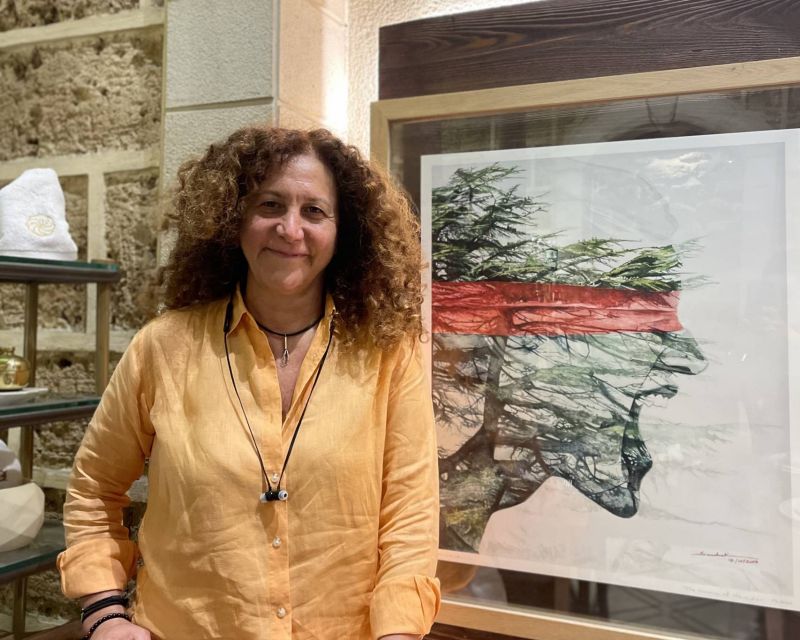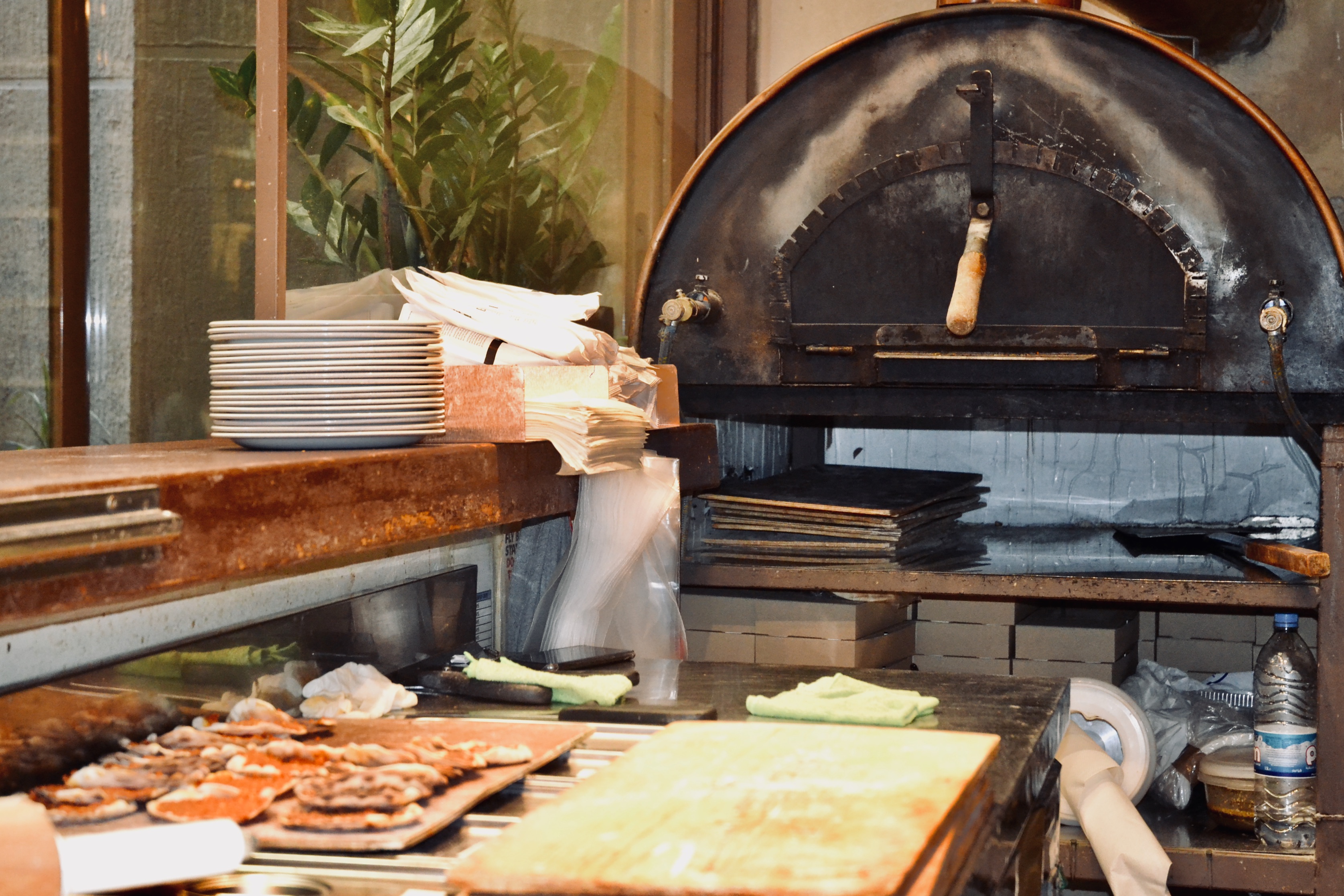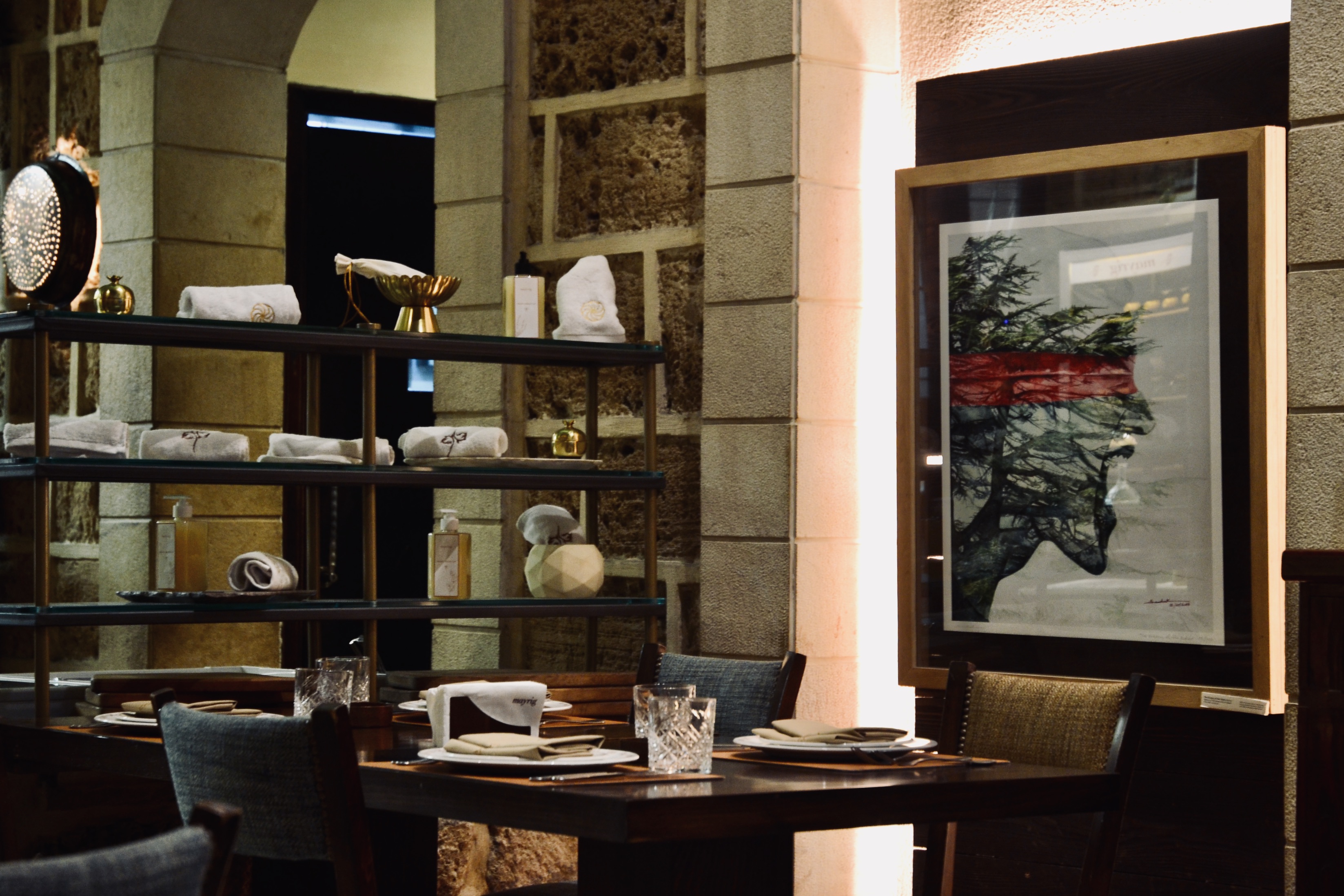
Aline Kamakian standing in her restaurant Mayrig in Gemmayzeh: behind her, a painting of what she believes represents her and her fury. (Credit: Yasmina Abou-Haka/L’Orient Today)
On August 4 2020, Aline Kamakian was standing on the terrace of her office in Gemmayzeh, separated from the Beirut Port by only the highway.
Attempting to curb the spread of COVID-19 amidst a spike in cases, the Lebanese government had reinstated a country-wide partial lockdown from July 30 to Aug. 3, and again from Aug. 6 to Aug. 10, leaving a 48-hour gap.
On Aug. 4, Aline Kamakian chose to open her Armenian restaurant Mayrig for the day. Despite the risks, the desire to provide income for her team and foster a sense of connection between lockdowns prevailed. Little did they know, the second lockdown would never be enforced.
On Aug. 4, 2020, Mayrig’s management team held a meeting to discuss strategy. When a fire erupted at the port across the street, everyone rushed to the terrace.“We saw the firefighters coming in. That’s how near we were. We’re on the third floor on top of Mayrig. You have the building, the highway, the explosion,” Kamakian recalled, gesturing with her hands.
They resumed their meeting, but Kamakian’s curiosity drew her back outside when she heard the first sounds of fireworks. She filmed the scene on her phone, intending to share it on social media.The next instant, the blast rocked the city, engulfing everything in its path.
“It was like sucking and throwing, high heat, and as if something exploded inside of me. When I stood up, I had a lot of stuff on me,” she remembered.“My hair was half burned and I couldn’t hear.”
Her team members who could still walk looked at her, their eyes questioning. All she could offer them were the reassuring words: “Don’t worry, we’re gonna come back. Don’t worry”.
On the day Kamakian came to Mayrig to clean after the explosion, she felt powerless.
“I didn’t have water to drink, I didn't have bread to eat.” They brought sandwiches from Batchig, Antelias, which drew curious stares from onlookers. Kamakian asked the chef at Batchig, another restaurant she owns, to double the number of sandwiches the next day.
“We were 50 on the first day, 100 on the second, 300 on the third.” But Kamakian realized that those working to clean the streets after the blast could not survive on sandwiches alone — she wanted to provide hot meals.
“We started bringing big pots here, making fire with the broken wood, to cook and distribute …. We reached 2,500 hot meals distributed every day over three months. This was the only way for us to be able to survive.”
‘I have a doctorate in infijirat’
The Aug. 4 Beirut port explosion was not Kamakian’s first near-death experience.
She survived the 2005 Hariri explosion in Beirut and the 2016 Brussels bombings. Kamakian humorously says she has a “PhD in explosions” —expertise she gained through her firsthand encounters.
To pay homage to her Armenian roots, she started Mayrig in the heart of Gemmayzeh in 2003.
“I didn’t know a lot about it. But with the know-how of my mother and the dream of my father, I did Mayrig,” Kamakian said.
“After the blast, I went to the mayor's office to report the incident, which I didn’t have. Deed, which I also didn’t have. Everything exploded. I don’t have them,” recalled Kamakian. “It’s not that I’m not an organized person. I don’t have them. My office exploded. My home exploded. I am no one, literally.”
“The worst thing is that, you know, it’s the same feeling as an Armenian of the genocide. A hundred years have passed, yet, no one has said sorry, no one has said ‘excuse me,’ no one has told you ‘I have done wrong.’ It’s the same shit here. No one admits, as if nothing happened.”
Kamakian emphasized the importance of seeking justice and the duty to honor the memory of the souls that were lost.
“We owe this to them. It’s not an act of war, it’s not foolishness, it’s someone’s mistake.”
 A traditional Armenian oven at Mayrig, with ‘lahmajun’ being prepared. (Credit: Yasmina Abou-Haka/L’Orient Today)
A traditional Armenian oven at Mayrig, with ‘lahmajun’ being prepared. (Credit: Yasmina Abou-Haka/L’Orient Today)
Rebuilding Mayrig
After the blast, Kamakian reached out to a small contractor and set a seemingly impossible deadline of a week to rebuild, determined to revive her establishment and provide employment for her team— seven of whom were disabled by the blast.
“Financially speaking, no one with sound financial knowledge or business acumen would opt for reconstruction. It defied logic. In normal circumstances, one plus one equals two, but in this case, one plus one equals zero.”
Between a crowdfunding campaign and multiple pitches to NGOs, Kamakian was able to gather the resources she needed to go through with the repairs.
Donors were reluctant to provide direct monetary assistance, she said. They focused on providing material assistance and rebuilding services. Certain NGOs, like Nusaned for instance, specifically supported businesses. Nusaned collaborated with the Syndicate of Owners of Restaurants in Lebanon, recognizing that Gemmayzeh and Mar Mikhael were predominantly restaurant areas. With their help, Mayrig rebuilt the damaged glass storefronts.
“Without their intervention, I wouldn't have been able to achieve it…The reconstruction alone cost approximately $25,000, which I simply didn't possess during that time,” expresses Kamakian..
Kamakian acknowledged the vital role her team played in the survival of Mayrig and its rebirth.
“For Mayrig to stand here today, it is because of them,” Kamakian affirmed. “They have not only poured their sweat but also shed their blood within these walls.”
Rebuilding the environment
Kamakian recognized the importance of preserving the wider ecosystem.
“You cannot survive alone. You need a place, an entity, an environment,” she stressed. “You cannot open a restaurant in the desert, you need an environment afterwards. It’s not about you.”
She advocated for support and worked alongside NGOs and organizations to ensure the resurgence of the ecosystem of local businesses in areas affected by the blast. They quickly came up with a system to support entrepreneurs in paying salaries post-blast and amidst the financial crisis.
“If I pay 1 million LBP, and an NGO pays 1 million LBP to a working person, not someone merely staying at home and sleeping, the cycle works. What we wanted was to keep these people, to keep the entrepreneurs, to be able to pay salaries, but a decent salary because we [entrepreneurs] couldn’t pay decent salaries alone back then.”
 Mayrig’s restored interiors (Credit: Yasmina Abou-Haka/L’Orient Today)
Mayrig’s restored interiors (Credit: Yasmina Abou-Haka/L’Orient Today)
‘Call it resilience, I hate the word’
“There are a lot of sequels that we can see, [...] but there are hidden sequels, not hidden, covered. The sequels that we see are the destruction, that of our entire surrounding.”
“This is ripped but I don’t give a shit,” Kamakian told L’Orient Today, pointing to a cushion at the back of the room. She held back tears. “A wall can be restored but a soul can’t.”
Kamakian had the opportunity to leave Lebanon and join her brother in the United States, but she chose to stay.
“I don’t want to turn my back to Lebanon. I have almost traveled the world. I have lived in some places, studied in others. I love to travel, I love to eat, I love to discover but I love to live in Lebanon.”
“Look at Lebanon,” she added. “We are these people. This is our way to revolution. This is our revolution. This is our lifestyle and we will continue. We are not ashamed. It’s our right to sing, our right to dance, our right to take our restaurants back.”
“For me, this is our way of living and we should never stop this. This is what we are known for: l’Art de vivre, l’Art de recevoir [the art of life, the art of receiving]. Not everybody has it. It’s our added value and we are very proud of it. But until the truth comes out, I don’t think this tantrum will go away.”